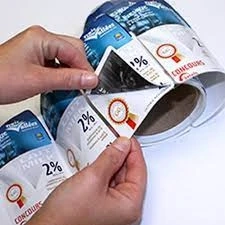Multi-layer labels have emerged as versatile solutions in various industries, offering innovative ways to convey information effectively. These labels, with their multiple layers, provide ample space for content without compromising the packaging's aesthetics. Here are seven great uses for multi-layer labels in India:
Product Information: Multi-layer labels excel in providing comprehensive product information. Whether it's nutritional facts, usage instructions, or regulatory compliance details, these labels offer sufficient space to accommodate all necessary data without cluttering the packaging.Sustainability Messaging: In today's environmentally conscious market, sustainability messaging holds significant importance. Multi-layer labels allow brands to incorporate sustainability-related information, such as recycling instructions or eco-friendly initiatives undertaken by the company or the tyre label manufacturer, thus appealing to eco-conscious consumers.Promotional Activities: Companies often utilise multi-layer labels to run promotional campaigns effectively. With the additional layers, businesses can include coupons, QR codes for discounts, or cross-promotional offers, enticing customers to engage with the product further.Localisation: For multinational companies, multi-layer labels facilitate localisation efforts. Brands can include product information in multiple languages without altering the primary packaging design, ensuring compliance with regional regulations and catering to diverse customer bases.Interactive Experiences: Multi-layer labels enable interactive experiences, enhancing consumer engagement. By incorporating elements like augmented reality (AR) codes or interactive games, brands can create memorable experiences for consumers, fostering brand loyalty and differentiation in the market.Enhanced Branding: Multi-layer labels in India offer opportunities for enhanced branding strategies. Brands can utilise the extra space to communicate their story, values, or unique selling propositions, reinforcing their identity in the eyes of the consumers.Regulatory Compliance: Compliance with regulatory standards is a top priority for businesses operating in highly regulated industries. Multi-layer labels provide a practical solution for accommodating mandatory labelling requirements while maintaining aesthetic appeal. From safety warnings to legal disclaimers, these labels help ensure that products meet all necessary regulations.Conclusion
Multi-layer labels offer many benefits across various industries, from providing comprehensive product information to enhancing branding and sustainability messaging. With their versatility and ability to accommodate diverse content, these labels have become indispensable tools for marketers seeking innovative ways to connect with consumers. Whether it's for promotional activities, sustainability initiatives, or enhancing the overall consumer experience, multi-layer labels continue to prove their worth in today's competitive market landscape. So, next time you come across a product adorned with a multi-layer label, take a moment to appreciate the ingenuity behind this versatile packaging solution.


